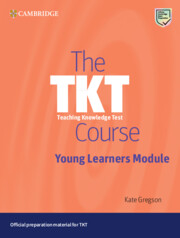Book contents
- Frontmatter
- Acknowledgements
- Contents
- Introduction
- Part 1 Knowledge of young learners and principles of teaching English to young learners
- Part 2 Planning and preparing young learner lessons
- Part 3 Teaching young learners
- Part 4 Assessing young learner learning in the classroom
- Follow-up activities: Answer keys and commentaries
- List of terms found in the TKT Glossary
- Glossary of TKT: Young Learners terms
- Test tips for TKT: Young Learners
- Teaching knowledge test young learners: Practice test
- Sample test answer sheet for TKT: YL practice test
- Answer key for TKT: YL practice test
Part 3 - Teaching young learners
Published online by Cambridge University Press: 14 March 2024
- Frontmatter
- Acknowledgements
- Contents
- Introduction
- Part 1 Knowledge of young learners and principles of teaching English to young learners
- Part 2 Planning and preparing young learner lessons
- Part 3 Teaching young learners
- Part 4 Assessing young learner learning in the classroom
- Follow-up activities: Answer keys and commentaries
- List of terms found in the TKT Glossary
- Glossary of TKT: Young Learners terms
- Test tips for TKT: Young Learners
- Teaching knowledge test young learners: Practice test
- Sample test answer sheet for TKT: YL practice test
- Answer key for TKT: YL practice test
Summary
Part 3 will help you better understand as well as use strategies and activities to teach and manage a young learner classroom effectively. You will deepen your knowledge about how to scaffold children's understanding and use of language through your own use of language and through strategies you may use in the classroom, then consolidate learning using appropriate practice activities. You will also consider strategies and techniques for managing young learners in class. This part of The TKT Course: Young Learner Module will support your knowledge and skills in preparation for the third part of the TKT: YL Module test: Teaching Young Learners. You can find more information in the TKT: YL syllabus in the module handbook, which is available online.
In the first unit of this part of the book, Unit 8, you’ll think about how to support and challenge learners using teacher language and teaching strategies. First, you’ll consider the use of the term scaffolding, both metaphorically in education and in its realworld use. You’ll then reflect on the teacher's role in scaffolding understanding and use of language before looking at strategies a teacher may employ to do this.
Unit 9 looks at practice activities, that is how we can use motivating, effective classroom activities to engage young learners and give them the opportunity to consolidate their language use and understanding through practice in the classroom. You’ll consider specific features of effective practice activities and points to keep in mind when planning them, before looking at examples of activities teachers have found effective in YL classrooms.
In Unit 10, we will focus on managing learning in YL classrooms. You will first think about what the term ‘classroom management’ means, then will consider how teachers can develop a positive classroom atmosphere, which will support children in their learning. Finally in this unit, you’ll look at how teachers can be more effective managers of challenging behaviour.
Towards the end of each unit, you will find follow-up activities, which are designed to deepen and extend your thinking in relation to the unit content. These will help you reflect on the classroom application of your learning in your own context. These are followed by a set of TKT: YL practice questions based on the unit theme.
- Type
- Chapter
- Information
- The TKT Course Young Learners Module , pp. 77 - 78Publisher: Cambridge University PressPrint publication year: 2024



